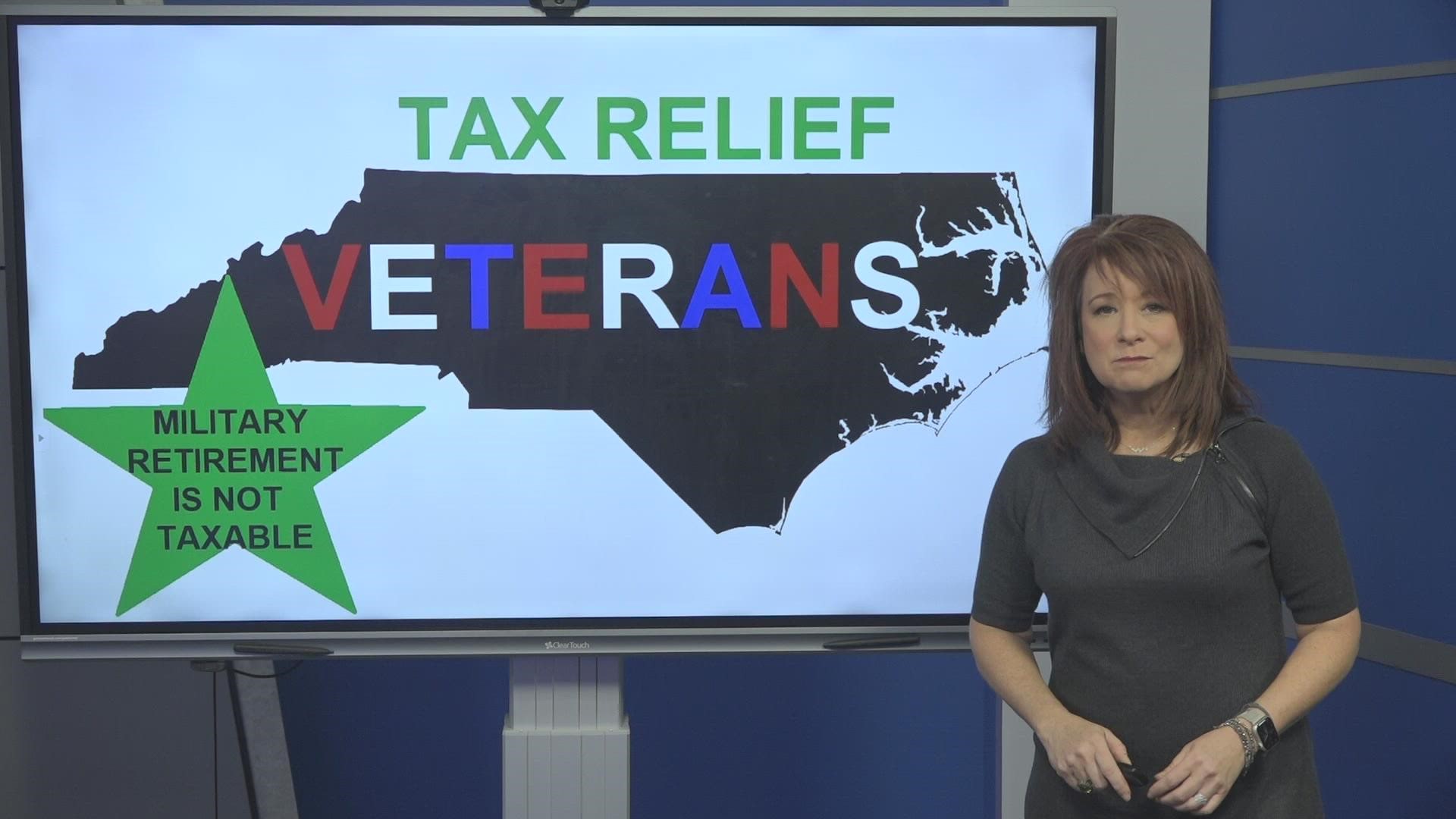GREENSBORO, N.C. — As we say thank you for this Veterans Day to all those who served the red, white, and blue, we want to call attention to the ways veterans can save a little green on their taxes.
“Nearly one in four military families qualify for the Earned Income Tax Credit which is up to $6,935 this year or the Child Tax Credit which is up to $2,000 this year. They aren’t automatic, just like they're not automatic for any taxpayer, you have to qualify,” said JW DeGance, Jackson Hewitt.
The Earned Income and the Child Tax Credit are on the 1040 IRS Tax Return form. Just because you've never claimed it before, doesn’t mean you don't qualify.
North Carolina has several tax relief items on the books, some of which have only been on the books for a year.
NON-TAXABLE INCOME: MILITARY RETIREMENT
This is new, it just started in 2021. Military retirement is not taxable income in North Carolina. It is still taxable on your Federal return, but not on your state return.
PROPERTY TAX RELIEF
If you're a disabled veteran you may qualify for property tax relief.
“We have the property tax relief for disabled veterans so it exempts the first $45,000 of property value for a qualified veteran that lowers their assessed property value which then lowers their property tax,” said DeGance.
QUALIFYING DISABLED VETS FOR PROPERTY TAXES:
If owned by a veteran: The veteran must either (1) have a permanent and service-connected disability of 100% or (2) receive benefits for specially adapted housing
OR
If owned by surviving spouse: The property owner must be the surviving spouse of either (1) a veteran who had a permanent and total service-connected disability or (2) a veteran that received benefits for specially adapted housing under 38 U.S.C. 2101 or (3) a veteran who died as a result of a service-connected condition.
Tax-Free Benefits
There are many tax-free benefits for Veterans of the Armed Forces:
Disability payment from an injury while on active duty
Disability pay from the VA, for a service-connected illness or injury
Post 9/11 GI Bill financial aid Payments you receive for education, and training by the VA are tax-free. You may still qualify for education credits for the portion you pay out of pocket.
Basic Housing Allowance
Money earned through the Compensated Work Therapy Program, (vocational rehabilitation program that helps veterans acclimate back into the community)
Retroactive Tax Credits (if the VA determines your percentage of disability has changed)
Retroactive tax credits may be available for certain veteran disability claims. There is a special way of handling Veterans Affairs disability claims in order to get credit for retroactive disability claims and require an amended return for those tax years. A special statute of limitations extends 1 year. Instead of the standard limitation of going back 3 years, Veterans can go back an additional year but are subject to the date of determination
Family of Deceased or Disabled Veterans
Family members of deceased or disabled veterans may also receive benefits, and some of them may be tax-free. This includes spouses, children, and parents of service members
VA Dependency and Indemnity Compensation (DIC) rates for the surviving spouses and dependent children of Veterans.
If the family member or members qualify for Survivor Pension and VA DIC then they would be paid the higher of the two. They can’t receive both.
Military Considerations:
- Nontaxable pay (Combat Pay, Basic Allowance for Housing, Basic Allowance for Subsistence)
You don’t have to include them as earned income on federal taxes, but you can if it will help your tax situation. An example would be adding nontaxable pay as taxable to qualify for EITC (Earned Income Tax Credit) you may owe less tax and get a larger refund.
To add nontaxable pay there are the following rules:
- You include all your nontaxable pay while your spouse doesn’t include nontaxable pay
- You choose to include none of your nontaxable pay while your spouse includes all of their nontaxable pay
- Both choose to include all nontaxable pay
- Both choose not to include any of your nontaxable pay

